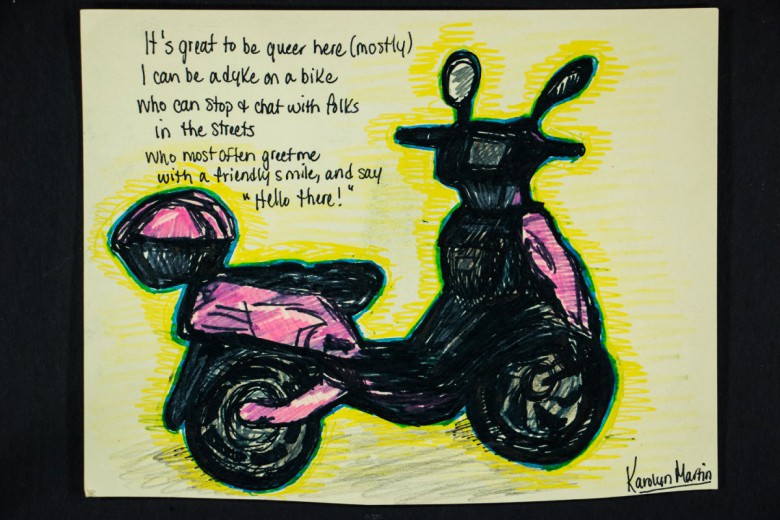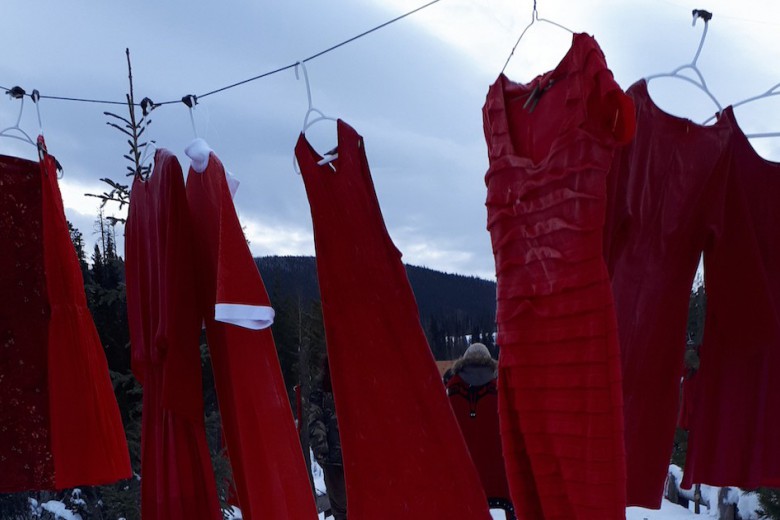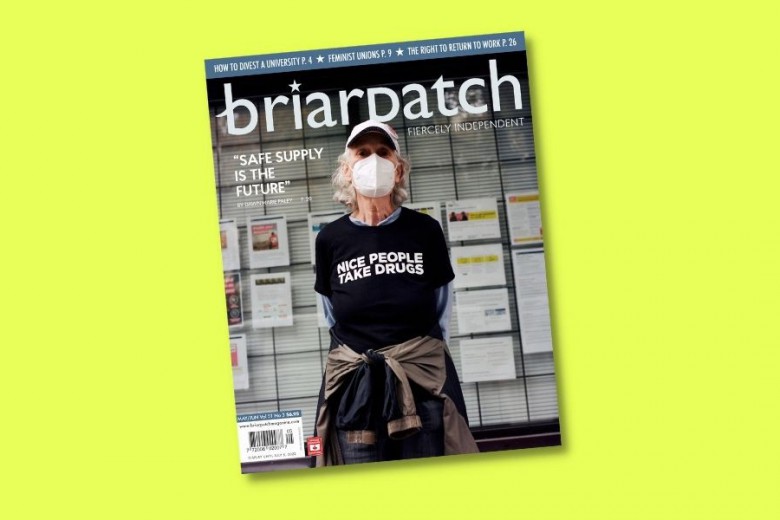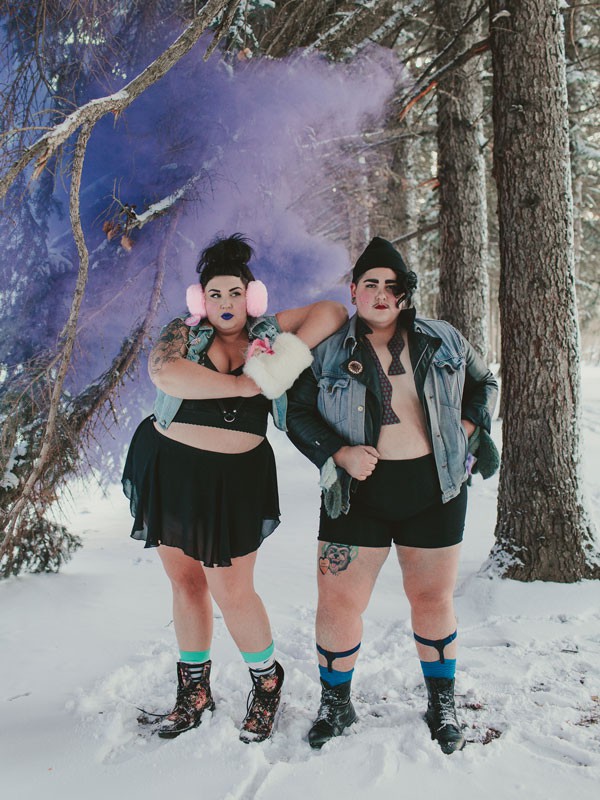
I want to talk about body positivity on the Prairies and break the idea (and expectation) that there’s no movement here. The Prairies – and Calgary in particular – can be an isolating, conservative place to organize, and because of this, the connections with people here who are working and living for change are vital. Jessica and Fleetwood Luxery-Legay are these kind of people. We are, to use one of their Twitter hashtags, #gayweeds that grow in thin soil on the side of a rocky foothill.
Body positivity changed my life. Growing up in Calgary in a WASPish family taught me to hate my fat body – i.e., myself – and to exist in a trans body that was disconnected from my gender. Mainstream North American culture has oppressive ideas about bodies, how they should look, the things they should be able to do. These ideas are so ingrained that they become a part of us. Changing consciousness at will is magic, and in this way body positivity is magic. Personally, it wasn’t easy and it didn’t happen overnight. It took years, work, thoughts, affirmations, sweat, and love. Body positivity brought me to finding the beauty and inherent validity in the bodies of my fat, trans, disabled and otherwise othered lovers and friends. What was more difficult was later finding that same beauty and love in myself. Now that the magic has happened, this shift in consciousness, it can’t be undone. Self-love is a powerful spell.
Jessica and Fleetwood Luxery-Legay are two white, working-class queers whose love has crossed borders and a whole lot of social stigma. They are movement builders for body positivity and self-love, using social media as a vehicle for empowerment and change. Their blogs, including Tangled Up In Lace, have thousands of followers and they have created an online video series called Heavy Petting. They both use prose and photos to challenge what we think we know about beauty, desirability, and what is considered acceptable.
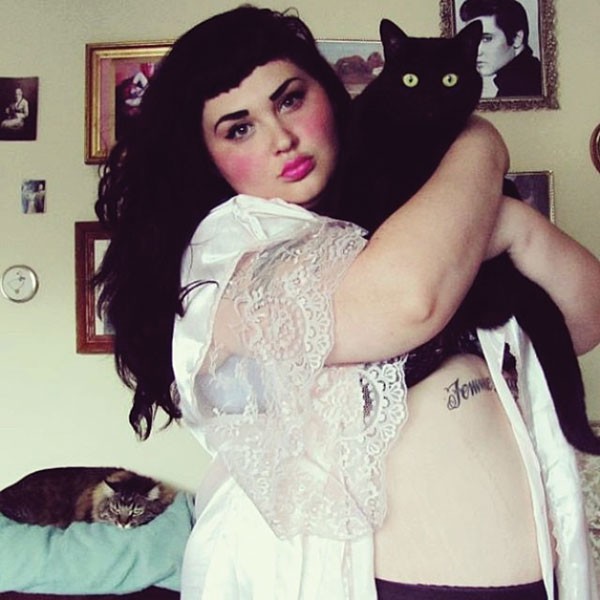
Would you care to share some of your fat story?
Jessica: I was raised by a fat mother with a lifetime of poor body image and forced dieting by her family. My mom started me in Jenny Craig and Weight Watchers when I was seven. I’ve always had restricted eating and really poor messages about femininity and fatness. I did a lot of destructive things to try and be skinny but never got skinny no matter how hard I tried. When I found fat acceptance at age 21 or 22, I had gotten to a place on my own before getting into the activism around it, thinking it wasn’t that bad that I was fat. I could find a lot of ways to justify it and partially celebrate it. Then I found the politics through a fat friend and the online community of Fatshionista. I was later in a documentary called The Fat Body (In)Visible, and it just took off from there. I got more involved, and that led me to projects, and to Fleetwood.
Fleetwood: I remember feeling like I was the only fat person. That was really isolating and I think contributed to a lot of self-hatred. When I was in my early 20s, a lifetime of hating myself and not accepting who I was crashed into a new reality and community. I went from being in a destructive life situation filled with self-loathing, to learning about and grappling with anti-oppressive, feminist, and queer politics. One of my first girlfriends was a thin girl who really liked fat girls, and that was awesome, weird, and sort of complicated. I was a radical cheerleader, a feminist, and that was all about accepting your body and accepting who you were, but it wasn’t explicitly about loving fat bodies or thinking about how all bodies are good bodies. I realized soon after that I was genderqueer and started at the University of Victoria. I remember a time at UVic where a thin lesbian said some really horrible things about fat bodies, and I was really disappointed that none of my skinny friends said anything. I went home and wrote this piece called “Fat solidarity: The Basics” and somebody found it on Tumblr, and then I started getting hundreds and then thousands of followers.
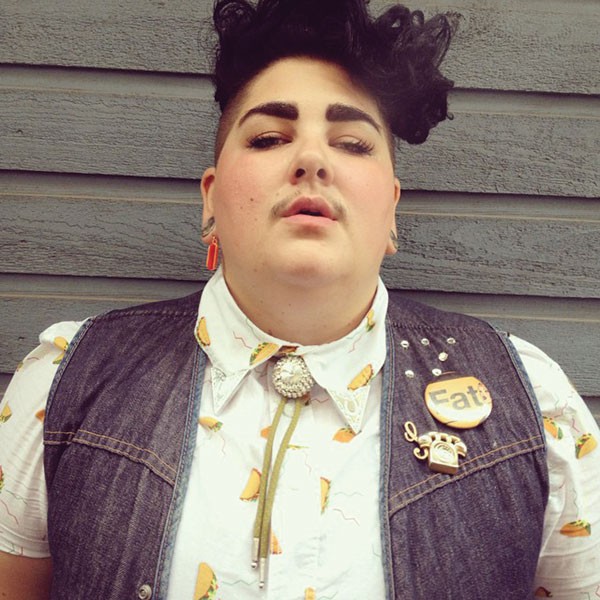
What does body positivity mean to you?
Fleetwood: In the words of Glenn Marla, “All bodies are good bodies.” Just recognizing that we live in a world where bodies are constantly scrutinized and devalued in certain ways while other bodies are privileged and we reproduce this on so many levels, not just through the media, but as individuals and through institutions. So it’s acknowledging this devaluing as a truth and working to spread body love and create new ideas about how we should value bodies.
Jessica: We deconstruct the messages we hear about bodies and abilities and money, how you decorate your body, and what your body is able to do or not do. Turning those really negative messages around, combatting them in your day-to-day life, and honouring this vehicle that you have.
One of the things that resonates with me a lot in your work is queer positivity and intersectional analysis of oppression.
Jessica: I started out in fat acceptance which is a really straight, white, femme, money-saturated space. I started to move away from it because, one, I’m not straight, and, two, it was really visible to me how those conversations came to a halt once other bodies needed to be considered, like my partner’s body for instance – poor bodies are different, people of colour. I was seeing who was privileged and who wasn’t being heard. There needed to be a lot more work, which is why I started moving more toward speaking about that stuff, which isolated me from the dominant fat acceptance movement.
Fleetwood: Part of my undergrad involved developing critical perspectives: instead of fat activism, I started thinking about what adopting a body politic could make possible when it comes to race, decolonization, ability, disability, fatness, and class. I see body politics holding a lot more than I see fat acceptance holding.
As a genderqueer person, I notice that often in public people feel like they have access to me – to touch me, talk to me, comment about my body – and that’s really exacerbated by my fatness. It’s similar to Jessica being a femme, how people are always slut-shaming her or talking over her in public.
Gender and fat embodiment is complicated.
Jessica: I hear that femme means woman, and that means dresses and long hair and all of these restricting things, restricting ideas of what it means to be a woman or feminine. I think my fatness really challenges a lot of people because of my femme identity, because I don’t dress how a fat woman should dress. I don’t hide, I don’t do smoke in mirrors so you can’t tell how fat I am or what my fat body actually looks like. I try and dress in a way that really showcases the ways that I want to be in this world. I want you to know I’m gay and I love it. It’s just really hard for people to think about how this fat person is wearing whatever and also takes pleasure in seeking out pleasure. It’s like fat people aren’t supposed to have sex or feel good about themselves.
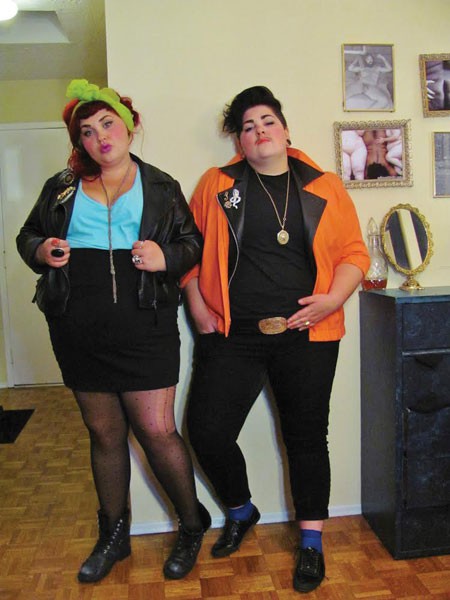
Fleetwood: Sometimes my fatness is really connected to my genderqueerness and how I present myself to the world. I love to flaunt my thunder thighs because it feels really fucking good and I am tired of hiding my body. And I love to have a moustache because I was fucking born with one, and I love to wear really tight clothes and glitter on my eyebrows – or anywhere really. And I’m neither a boy nor a girl.
Jessica: I’ve heard you say that being genderqueer and fat is really challenging. Considering what is available to us, it would be a lot easier to express gender in the way you see it, if your body was small. Fat trans people may need your solidarity and affirmation. It sucks sometimes, but also you find really creative ways to showcase and express your body – you find possibility.
Fleetwood: That is what I wasn’t going to talk about. I wanted to talk about how it’s awesome to be fat and trans because sometimes it’s really shitty to be fat and trans. Clothes are definitely a hugely shitty thing for me. Having to wear a binder is really hard – I have chronic pain from it. I would say that when you’re fat and trans, you experience a lot of violence, on various levels, but what I learned is that being my true, fat, transy authentic self will sustain me in a way that hiding cannot.
I invite you to talk about using social media for social change.
Jessica: Being online empowers you to go out into the world. Sometimes I go out and I feel really hot and flabulous, and I don’t find that other people agree in my day-to-day life. If I go to the Internet and share a story of challenging someone or share a fabulous outfit, then that can make space for other people to be brave in their off-the-keyboard life.
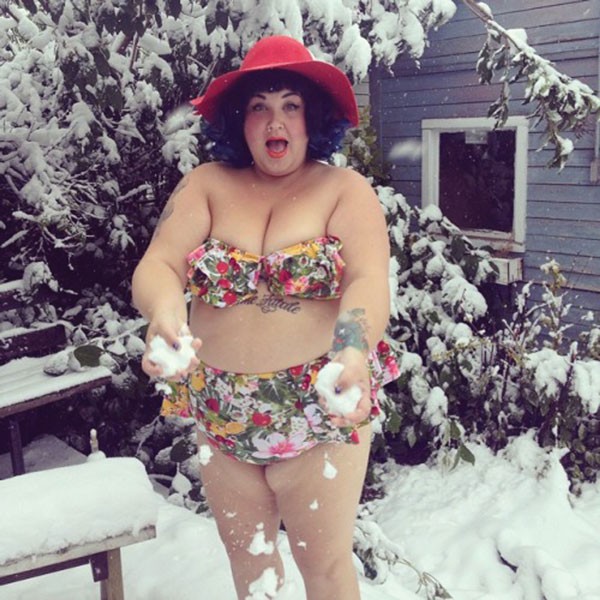
Fleetwood: The online fat femme community changed my life, including meeting Jessica, going from being like “Do you know Tangled Up in Lace?” and being like “Oh yeah, I think I’ve seen her blog” to being like “Shit, you’re my soul scissor sister.”
What is the relationship between body positive activism and the land we are meeting on today?
Jessica: I think for me, coming to a place where I acknowledge that I am a white settler and am working through that identity, and loving my body, I realized how colonized the world was.
Fleetwood: Evan Etcetera used to write these zines called Dirty Love. In the second issue, they talk about the concept of re-membering: the idea of coming back to your body or, from an experience of trauma, coming back to yourself. I’m always trying to think about the intersections and pieces and layers of who we are and how they are political, also how we are moving forward. So re-membering the land I’m on and acknowledging that I’m on Blackfoot territory and being in solidarity and working with people who are trying to address the effects of colonization is always part of that.


